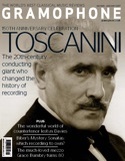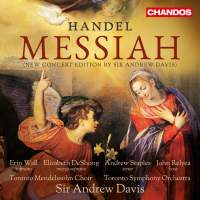Texte paru dans: / Appeared in: |
|
|
Outil de traduction (Très approximatif) |
|
|
Reviewer:
Andrew Farach‑Colton
Here, Davis gives us his own edition. ‘My aim was to keep Handel’s notes, harmonies and style intact’, he writes, ‘but to make use of all the colours available from the modern symphony orchestra in order to underline the mood and meaning of the individual movements.’ Some of his editorial choices are bold and many are imaginative – though a far cry from Eugene Goosens’s famously extravagant reorchestration, commissioned (and vividly recorded) by Thomas Beecham in 1959 (RCA, 5/60). Davis sets the first part of the Overture for winds and brass rather than strings, for instance, and his scoring made me think of Holst’s suites for military band. ‘I know that my redeemer liveth’ features a prominent part for solo clarinet that transports Handel’s sound world closer Mozart’s or even Richard Strauss’s. More often, though, Davis’s intention seems to be embellishment rather than reimagining. Note the snare drum punctuation in ‘Thus saith the Lord’; cymbal rolls in ‘But who may abide?’; sprinklings of pizzicato strings in ‘O thou that tellest good tidings to Zion’ and ‘His yoke is easy’; and the ghostly shadow of a marimba in ‘How beautiful are the feet’. The trouble is that sometimes even these relatively subtle decorations prove to be distractions rather than enhancements. As pretty as the glittering xylophone is in ‘For unto us a child is born’ and ‘All we like sheep have gone astray’, for example, such trimmings give off the faint but distinct air of a Christmas ‘pops’ concert. Setting aside the textual emendations, this new interpretation is not all that different from its predecessor. Davis’s conception of Messiah isn’t particularly dramatic or even all that grand, compared with, say, Sargent (EMI) or Ormandy (Sony). Rather, I’d characterise it as gentle and sweetly affectionate, with an odd balance of sincerity and emotional reserve. Tenor Andrew Staples and mezzosoprano Elizabeth DeShong are both superb, dramatically alert and technically fluent. John Relyea is compelling, too, despite his singing flat at times and the now papery quality of his once formidable tone. Erin Wall is a fine soprano but sounds ungainly here, smudging her runs and weighing down phrases that should soar. The Toronto Mendelssohn Choir sound slightly less secure than on their older EMI recording, with some noticeable glitches in intonation and ensemble. The orchestra, however, do a terrific job realising Davis’s flights of fancy. This is obviously not a ‘basic library’ Messiah but can be cautiously recommended as a curiosity for those who enjoy arrangements and transcriptions. |
|




